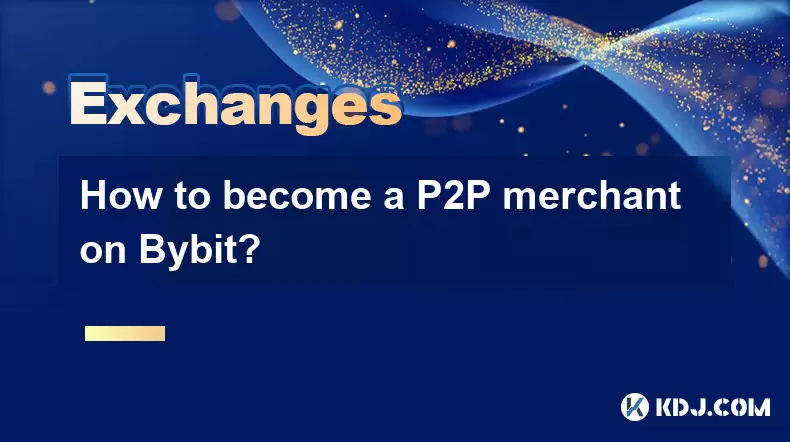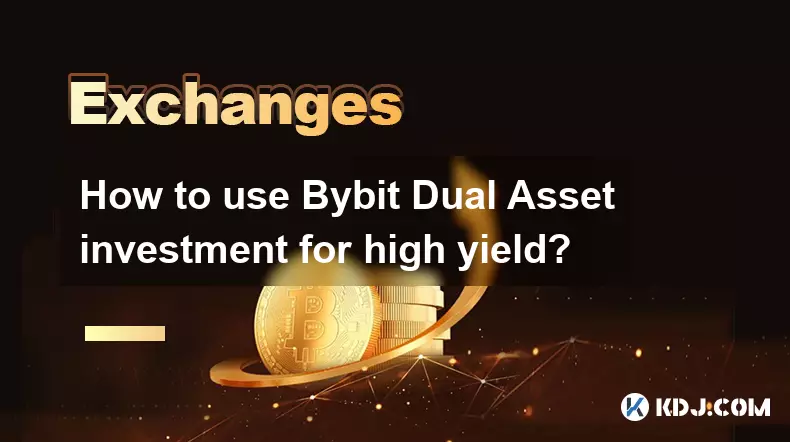-
 bitcoin
bitcoin $87959.907984 USD
1.34% -
 ethereum
ethereum $2920.497338 USD
3.04% -
 tether
tether $0.999775 USD
0.00% -
 xrp
xrp $2.237324 USD
8.12% -
 bnb
bnb $860.243768 USD
0.90% -
 solana
solana $138.089498 USD
5.43% -
 usd-coin
usd-coin $0.999807 USD
0.01% -
 tron
tron $0.272801 USD
-1.53% -
 dogecoin
dogecoin $0.150904 USD
2.96% -
 cardano
cardano $0.421635 USD
1.97% -
 hyperliquid
hyperliquid $32.152445 USD
2.23% -
 bitcoin-cash
bitcoin-cash $533.301069 USD
-1.94% -
 chainlink
chainlink $12.953417 USD
2.68% -
 unus-sed-leo
unus-sed-leo $9.535951 USD
0.73% -
 zcash
zcash $521.483386 USD
-2.87%
How to become a P2P merchant on Bybit?
To become a P2P merchant on Bybit, complete KYC, build a solid trading history, and apply via the P2P dashboard to provide liquidity and set your own trade terms.
Aug 05, 2025 at 12:22 pm

Understanding the Role of a P2P Merchant on Bybit
Becoming a P2P merchant on Bybit means participating directly in the peer-to-peer trading ecosystem by offering to buy or sell cryptocurrencies using fiat currencies. Unlike regular traders who execute spot or derivative trades, P2P merchants act as liquidity providers on the platform, setting their own terms such as price, payment methods, and trade limits. Bybit’s P2P platform allows users to trade USDT, BTC, and other supported cryptocurrencies against fiat currencies like USD, EUR, and local currencies, depending on the region. As a merchant, you gain access to tools that help you manage orders, set automatic replies, and build a reputation through successful transactions.
To be eligible, users must understand that Bybit enforces strict compliance and verification standards. This includes completing KYC (Know Your Customer) verification, which involves submitting government-issued identification, a selfie, and sometimes proof of address. Only users with a verified identity and a track record of reliable trading behavior may be approved as merchants. The system evaluates factors such as transaction history, dispute rates, and response times before granting merchant status.
Prerequisites for Applying as a P2P Merchant
Before applying, ensure you meet the following requirements:
- You must have a verified Bybit account with Level 2 KYC completed.
- Maintain a minimum trading volume or history on the P2P platform as a buyer or seller (specific thresholds may vary by region).
- Have a stable internet connection and access to reliable payment methods accepted on Bybit P2P.
- Ensure your account has no unresolved disputes or violations of Bybit’s P2P Terms of Service.
One of the critical aspects is building a positive trading reputation. Even if you meet all technical requirements, Bybit’s system may delay approval if your recent trading behavior shows late confirmations, frequent cancellations, or negative feedback from counterparties. It is essential to consistently complete trades on time and communicate professionally.
How to Apply to Become a P2P Merchant on Bybit
The application process is integrated within the Bybit app and website. Follow these steps carefully:
- Log in to your Bybit account via the official website or mobile application.
- Navigate to the P2P Trading section by clicking on “Trade” and selecting “P2P” from the dropdown menu.
- Click on your profile icon or avatar in the top-right corner and select “P2P Merchant Application” or a similarly labeled option.
- Review the merchant obligations and rules, including required response times, trade limits, and dispute policies.
- Submit the application by clicking the “Apply Now” button.
After submission, Bybit’s system will evaluate your profile. This process may take up to 72 hours, though it can vary based on region and application volume. You will receive a notification via email or in-app message once your application is approved or rejected. If rejected, you may reapply after improving your trading history.
Setting Up Your Merchant Profile and Trading Parameters
Once approved, you can begin configuring your merchant settings. This step is crucial to attract buyers and maintain a competitive edge.
- Access the Merchant Center from the P2P dashboard.
- Define your supported cryptocurrencies (e.g., USDT, BTC) and the fiat currencies you’re willing to accept.
- Set your preferred payment methods, such as bank transfer, PayPal (if supported), Alipay, or others. Ensure these accounts are verified and linked to your identity.
- Configure your price spreads—you can choose to set a fixed price or a percentage above/below the market rate.
- Establish trade limits, including minimum and maximum amounts per transaction. These should align with your liquidity and risk tolerance.
- Customize auto-reply messages for common inquiries like payment confirmation or delays.
It is vital to keep your order availability updated. If you are unable to fulfill trades, temporarily disable your listings to avoid penalties. Bybit monitors merchant responsiveness, and prolonged inactivity can lead to suspension.
Managing Orders and Maintaining Merchant Status
As a live merchant, you will receive trade requests from users who wish to buy from or sell to you. Managing these efficiently is key to maintaining your standing.
- Monitor your active orders dashboard regularly.
- When a buyer initiates a trade, you will receive a notification. You must confirm receipt of fiat payment within the stipulated time (usually 15–30 minutes).
- Use the “Confirm Payment Received” button only after verifying the funds have arrived in your linked account.
- Release the cryptocurrency from escrow immediately after confirmation.
- Respond promptly to buyer messages and provide clear instructions if needed.
Failure to confirm within the time limit may result in automatic release of crypto to the buyer, causing financial loss. Similarly, falsely marking payment as received can lead to account suspension and fund freezing. Disputes are resolved by Bybit’s arbitration team, which reviews chat logs and payment proofs.
Maintain a high completion rate and low dispute ratio to preserve your merchant privileges. Bybit may conduct periodic reviews and downgrade or remove merchant status for underperforming accounts.
Tips for Success as a P2P Merchant on Bybit
To thrive as a merchant, consider the following best practices:
- Offer competitive pricing without sacrificing profit margins.
- Support multiple fast payment methods to increase order volume.
- Keep your online status active during peak trading hours.
- Use clear and professional communication in all interactions.
- Regularly check for system updates or policy changes in the Merchant Center.
Avoid engaging in trades outside the Bybit platform or requesting additional fees not reflected in your listed price. Such actions violate terms and can lead to permanent bans.
Frequently Asked Questions
Can I be a P2P merchant on Bybit without prior trading history?No. Bybit requires users to demonstrate a consistent and reliable trading history on the P2P platform before applying. New accounts with no completed trades are typically not approved. Engage in several successful transactions as a buyer or seller first.
What happens if I miss a payment confirmation deadline?If you fail to confirm receipt of fiat within the allowed time, the system will automatically release the cryptocurrency to the buyer. This protects buyers but results in a loss for you. Repeated incidents may lead to temporary suspension.
Are there fees for being a P2P merchant on Bybit?Bybit does not charge a direct fee for merchant status. However, transaction fees may apply based on your trading volume and currency pair. Always review the fee structure in the P2P section under “Fee Rules.”
Can I use multiple accounts to operate as a P2P merchant?No. Bybit’s policies prohibit multi-accounting for P2P trading. Each individual is allowed one merchant account. Operating multiple accounts can lead to all associated accounts being permanently banned.
Disclaimer:info@kdj.com
The information provided is not trading advice. kdj.com does not assume any responsibility for any investments made based on the information provided in this article. Cryptocurrencies are highly volatile and it is highly recommended that you invest with caution after thorough research!
If you believe that the content used on this website infringes your copyright, please contact us immediately (info@kdj.com) and we will delete it promptly.
- GPT-5.3 Codex-Spark Ignites AI Coding with Cerebras Hardware, Achieving Unprecedented Speeds
- 2026-02-13 09:35:01
- Blooming Forever: Florida Roses, Valentine's Day, and the Enduring Appeal of Long-Lasting Plants
- 2026-02-13 09:50:02
- Crypto PAC Fairshake Targets Congressman Al Green in High-Stakes Primary, Fueling Political Debate
- 2026-02-13 09:50:02
- Bitcoin Traders Secure Partial Profits as Market Hovers Near $68K Amidst Range Dynamics
- 2026-02-13 07:40:02
- Crypto ETFs Gain Lasting Appeal as Investment Landscape Evolves
- 2026-02-13 06:50:01
- Enlivex Therapeutics' RAIN Token Makes a Big Splash on Kraken Exchange, Cementing Digital Strategy
- 2026-02-13 07:30:02
Related knowledge

How to use Bybit VIP program to reduce trading fees?
Feb 11,2026 at 07:19am
Understanding Bybit VIP Program Structure1. The Bybit VIP program categorizes users into tiers based on their 30-day average net asset value and tradi...

How to buy JasmyCoin (JASMY) on Bybit?
Feb 09,2026 at 03:40am
Creating a Bybit Account1. Navigate to the official Bybit website and click the 'Sign Up' button located in the top-right corner. 2. Enter a valid ema...

How to contact Bybit customer support for urgent help?
Feb 05,2026 at 11:40pm
Accessing Bybit Support via Live Chat1. Log in to your Bybit account using the official website or mobile application. 2. Navigate to the Help Center ...

How to buy Injective (INJ) on Bybit in 2026?
Feb 09,2026 at 05:39pm
Account Registration and Verification Process1. Navigate to the official Bybit website and click the “Sign Up” button located in the top-right corner....

How to use Bybit Dual Asset investment for high yield?
Feb 06,2026 at 12:20am
Understanding Bybit Dual Asset Investment Mechanics1. Dual Asset Investment is a structured product offered by Bybit that combines a stablecoin deposi...

How to buy Celestia (TIA) on Bybit exchange?
Feb 10,2026 at 09:39pm
Creating a Bybit Account1. Visit the official Bybit website and click the “Sign Up” button located at the top right corner of the homepage. Enter a va...

How to use Bybit VIP program to reduce trading fees?
Feb 11,2026 at 07:19am
Understanding Bybit VIP Program Structure1. The Bybit VIP program categorizes users into tiers based on their 30-day average net asset value and tradi...

How to buy JasmyCoin (JASMY) on Bybit?
Feb 09,2026 at 03:40am
Creating a Bybit Account1. Navigate to the official Bybit website and click the 'Sign Up' button located in the top-right corner. 2. Enter a valid ema...

How to contact Bybit customer support for urgent help?
Feb 05,2026 at 11:40pm
Accessing Bybit Support via Live Chat1. Log in to your Bybit account using the official website or mobile application. 2. Navigate to the Help Center ...

How to buy Injective (INJ) on Bybit in 2026?
Feb 09,2026 at 05:39pm
Account Registration and Verification Process1. Navigate to the official Bybit website and click the “Sign Up” button located in the top-right corner....

How to use Bybit Dual Asset investment for high yield?
Feb 06,2026 at 12:20am
Understanding Bybit Dual Asset Investment Mechanics1. Dual Asset Investment is a structured product offered by Bybit that combines a stablecoin deposi...

How to buy Celestia (TIA) on Bybit exchange?
Feb 10,2026 at 09:39pm
Creating a Bybit Account1. Visit the official Bybit website and click the “Sign Up” button located at the top right corner of the homepage. Enter a va...
See all articles










































































